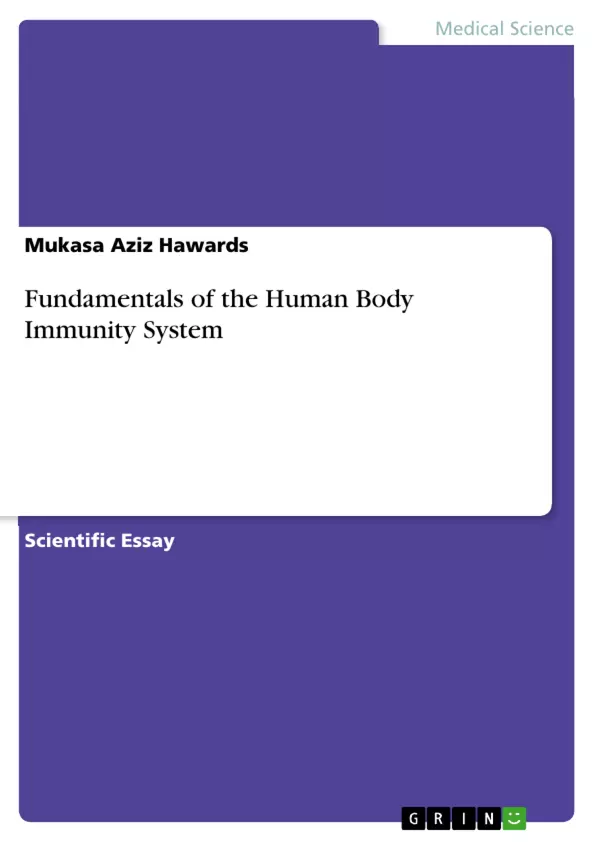In so many cases, we have been accustomed to the phrase “prevention is better than cure” yet in so many cases, we find ourselves victims of disease that in so many instances, we are not sure how we came to contract them but instead we embark on treatment after which we forget knowing about them.
It does not require extensive knowledge to realize that our body systems have inbuilt immune mechanisms by which humans survive the prevalent infections caused by the common bacteria located in almost every environment of man’s involvement. The fact of immunity is not an artificial health aspect built on man’s innovations in science but rather a natural fundamental of human life and therefore this provides the basis of preventive health and immunization.
Body immunity refers to the process or phenomenon through or by which the living body system is capable of identifying, isolating the foreign intruding harmful microorganisms and destroy or disarm them of the toxins that would be hazardous to the normal functioning of the body. The ability of the body to activate immunity against harmful microbes determines the health status of an individual and this is the foundation of immunology which is a perspective study directed against infectious disease spread in human communities.
Immunology, which is a basic subject in medical sciences, finds its purpose along with microbiology, infectious disease control. In consortium with these medical subjects, immunology is regarded as the study of the fundamental physiological body components (molecules, tissues, cells, organs and systems) that are responsible of isolating foreign harmful bodies and disposing them out. The significance of immunology in the health science world is that it explores the common trends of disease emergence with an intention not of epidemiological importance but far more to devise vaccination, which can is applicable to prevent it from continuity.
Through this conceptual and systematic study of immunology, the fundamental constituents of human immunity system, their functional pathways, regeneration, and replacement are analyzed. The study paper also entails the significance of immunology in the public health strategies of reducing health inequalities and disparities in the international community through international conventions on health policy structuring such as immunization are idealized.
Inhaltsverzeichnis (Table of Contents)
- Introduction
- Part I
- Historical Development
- Rationale of immunology in health promotion
- A Public Health Perspective in the Trends of Infectious Disease Prevalence
- Part II
- The Components of the Body Immune system
- The Lymphoid System
- Part III
- Types of Body Immunity
- Factors associated to immune response System efficiency
- Antigens, antibodies and the complementary system
- Antigens
- Antibodies
- The complementary system
- Part IV
- Preventive health care
- Strategic implementation of preventive health care
- The Public Health Capstone in the Immunology Paradigm
- Recommendations
- Conclusion
Zielsetzung und Themenschwerpunkte (Objectives and Key Themes)
This essay aims to provide a comprehensive overview of the human body's immune system and its fundamental role in public health. It explores the historical development of immunology, analyzes the components and functions of the immune system, examines different types of immunity, and discusses the strategic implementation of preventive healthcare measures.
- The historical development of immunology and its contribution to understanding disease prevention.
- The components and functions of the human immune system.
- The various types of immunity and their mechanisms.
- The role of immunology in public health strategies to reduce health inequalities and disparities.
- The importance of preventive healthcare measures in strengthening the immune system.
Zusammenfassung der Kapitel (Chapter Summaries)
The first chapter introduces the concept of body immunity and its importance in preventing disease. It highlights the natural mechanisms by which the body fights off harmful microorganisms and emphasizes the significance of immunology in public health.
Part I delves into the historical development of immunology, starting with Edward Jenner's groundbreaking work on smallpox vaccination. The chapter explores the evolution of understanding the immune system and its potential for combating infectious diseases.
Part II focuses on the components and functions of the immune system, outlining the essential elements that contribute to its effectiveness in fighting off disease. This includes an examination of the lymphatic system and its role in immune function.
Part III further explores the different types of immunity, including innate and adaptive immunity, and how these systems work together to protect the body from pathogens. It also discusses factors that influence immune system efficiency and the complex interplay of antigens, antibodies, and the complement system.
Part IV examines the importance of preventive healthcare in strengthening the immune system. The chapter highlights the strategic implementation of preventative measures, including vaccination programs, and emphasizes the central role of immunology in the public health paradigm.
Schlüsselwörter (Keywords)
The central keywords and focus topics of this essay include body immunity, immunology, infectious disease, public health, vaccination, prevention, health promotion, immune system, antigens, antibodies, complement system, and preventive healthcare.
Frequently Asked Questions
What is the primary function of the immune system?
The immune system identifies, isolates, and destroys foreign microorganisms and toxins to protect the body's normal functions.
What is the difference between innate and adaptive immunity?
Innate immunity is the body's first, non-specific line of defense, while adaptive immunity is a specialized response that develops after exposure to specific pathogens.
How do vaccines work with the immune system?
Vaccines stimulate the immune system to produce antibodies and memory cells against specific diseases without causing the illness itself, providing long-term protection.
What are antigens and antibodies?
Antigens are foreign substances that trigger an immune response, while antibodies are proteins produced by the body to neutralize or destroy those specific antigens.
Why is immunology important for public health?
Immunology provides the scientific basis for controlling infectious diseases, developing vaccination strategies, and reducing health disparities worldwide.
- Quote paper
- Mukasa Aziz Hawards (Author), 2013, Fundamentals of the Human Body Immunity System, Munich, GRIN Verlag, https://www.hausarbeiten.de/document/264197


